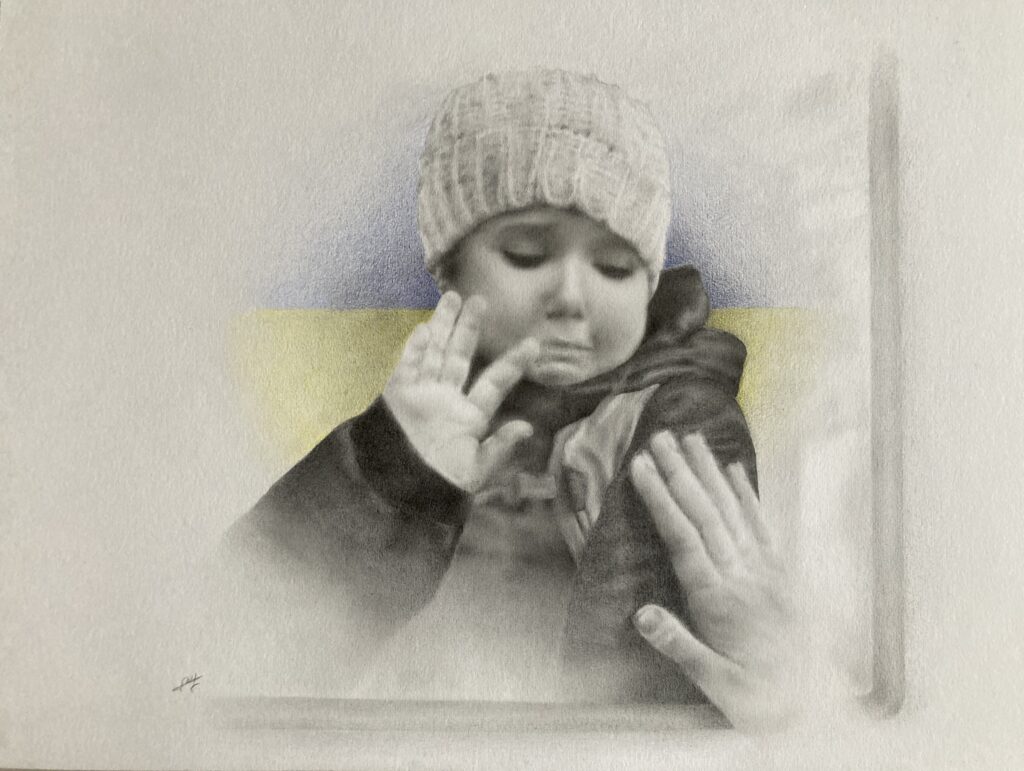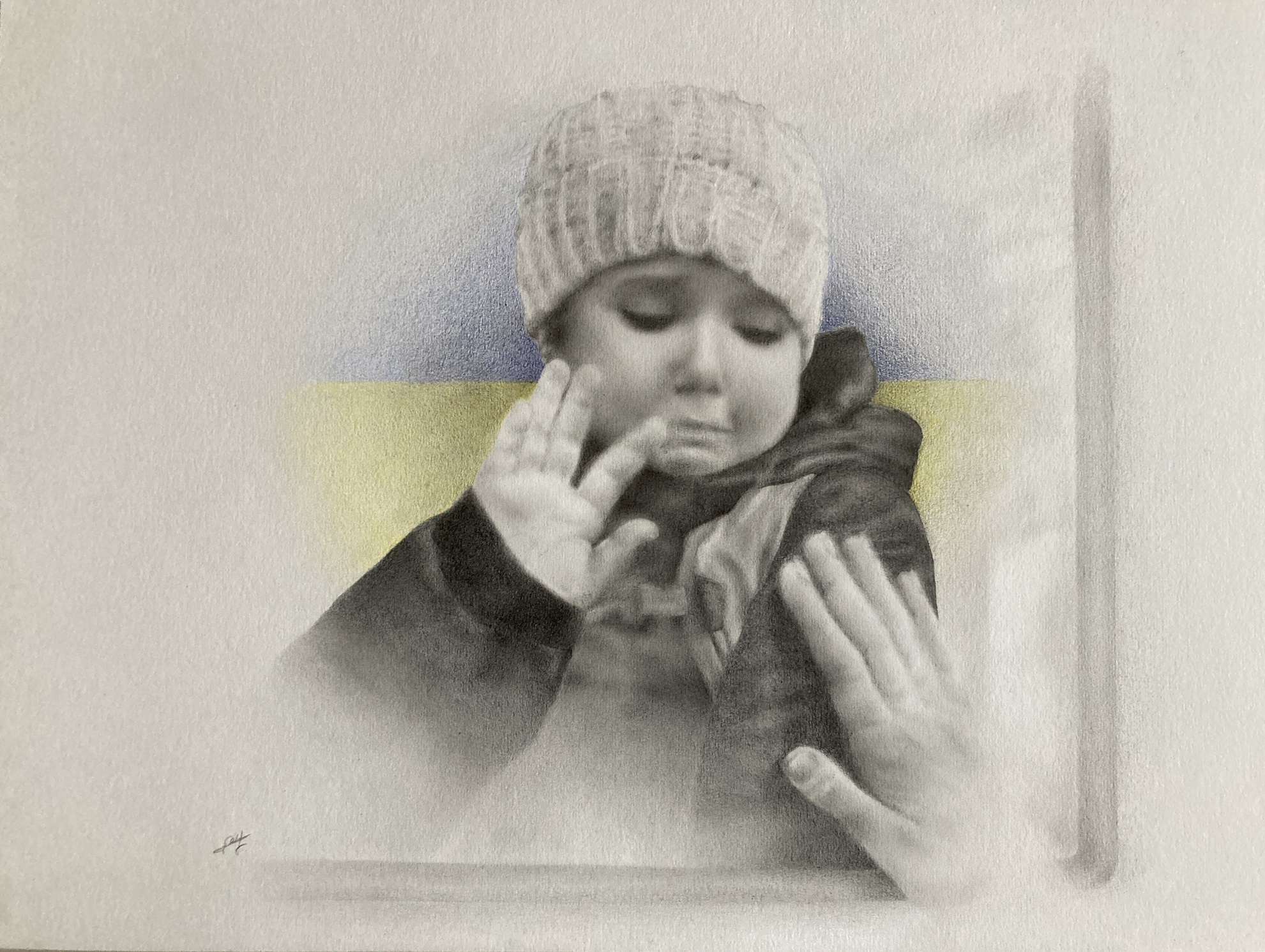This is the winning entry in the Columban Schools Media Competition 2023 (Ireland) by Katie Bonnes of St Louis Grammar School in Ballymena. It is illustrated by the winning image by Gabriela García Velarde of Christ the King Secondary School, Douglas, County Cork.
It starts from within
“For he himself is our peace, who has made us both one and has broken down in his flesh the dividing wall of hostility.” – Ephesians 2:14.
Conflict has plagued humanity from our beginnings; it was here before Jesus and has remained long after his resurrection. It is our flawed human nature to find difference and division within our species despite our converging paths and purposes.
The inevitability of conflict is clear; our kind is too colourful, too diverse, too full of unique ideas and perceptions to assure us of an alternative, but why must it be resolved through the bloodshed of innocent men, women and children? On earth, death is our only guarantee, so why has it become commonplace to indifferently inflict death on those whose lives are just as rich and valuable as our own?
This hatred that has embedded itself within our cultures as sectarianism, racism, sexism is futile. The attributes that segregate us are inconsequential in comparison to those that unite us, even fundamentally, we all bleed the same hue of crimson red.
Still felt today in Ireland are the echoes of grief and loss experienced during the Troubles. Yet, peace is on our horizon due to the brave efforts of our own peacebuilders.
Father Alec Reid and Reverend Dr Roy Magee were pivotal in peacebuilding in Northern Ireland. Both were called by God to initiate peace in their country, and it is these men who broke down the barricades between Catholics and Protestants here, brick by brick, in an attempt to grant God’s wish for peace.
We as a nation have them to thank for our Good Friday Agreement, they were united not only in Creed but in the faith that violence and sectarianism would only deteriorate this society that had such immense potential for prosperity. As Good Friday marks Jesus’ death for the sins of humankind, it holds for the people of Ireland the symbolic death of the most turbulent years of our Troubles also.
Our conflict may have been born from disagreements between faiths, but it was through faith that ceasefire was reached, and faith continues to navigate us toward the harmonious world to which we strive.
Although physical violence is no longer rife in the North, sectarianism can still be seen in communities, housing estates and even in the existence of our segregated education system. Groups like the Corrymela Community have been paramount in diffusing this blatant apartheid that is still so unnecessarily prevalent. Many have the opportunity to interact with people from faith backgrounds they are not exposed to regularly and are given the opportunity to relate to them without confining identity to faith alone.
I am an avid believer that the future of our peace and the future of the faith in Ireland is in the hands of our youth. Young people did not experience the raging wildfire that came before, merely the glowing embers of loss left in its wake. We have no reason to hate one another, except the ones given bitterly to us from those who lived in a different world, a hard, hurtful world that still tortures those who inhabited it.
This is this reason that peacebuilding is so imperative in schools, if half of our society is alienated and isolated, we estrange prospective peers, friends and partners. John Hume told us that “difference is an accident of birth, and it should therefore never be the source of hatred or conflict. The answer to difference is to respect it. Therein lies a most fundamental principle of peace: respect for diversity.”

Bye Mommy by Gabriela García Velarde
‘Love thy neighbour’, is the message that is permeated throughout all of Jesus’ miracles and parables. It transcends the idea of love in its modern interpretation. The love Jesus spoke of was the appreciation of life and beauty in the complexity of it. His message was unrelenting and unconditional, Jesus’ words were not ‘Love thy neighbour if they are white or black or man or woman’, we are to appreciate our differences and respect the background from which they came.
In many instances our strengths lie within our differences. St Paul compares the Church to a body, and references that the many parts of the body are stronger together, not able to function optimally if components are missing. We as a people, regardless of discrepancies in physical, emotional or spiritual being, serve better each other and ourselves when we not only tolerate but honour the wonder and diversity of God’s Creation as it is so easily lost, there lies the proof of why we must love our neighbours.
Peacebuilding will never lose its importance in the wider world. The need for peace today is as stark as it has ever been with the raging war in Ukraine, civil wars in Myanmar and Ethiopia and ongoing religious persecution throughout the globe. Courageous people, with the help of organisations like Christian Aid, visit these war-torn areas to help affected people, through practical, medical or spiritual means.
Pax Christi is another organisation that works globally to build peace through education, informing people of the importance of human rights and promoting reconciliation and justice, armed only with the Word as their weapon.
Organisations are able to work on massive scales to build peace, but it must be recognised that peacebuilding does not have to move mountains, it can be as elementary as a simple gesture that acknowledges our common human experience.
When we really know a person, their history and their struggles, we cannot hate them, or perhaps we cannot really know them until we stop hating them. Peacebuilding starts within ourselves, seeking out the good in those around us and taking small meaningful steps to better our world each day. These actions may seem insignificant, but a series of inconsequential actions will soon build to a tidal wave of change.
Matthew’s Beatitudes declares, ‘Blessed are the peacemakers: for they shall be called the children of God’ and my hope is that we all may lay claim to being God’s children.
For more information on the competition and winners see www.columbans.ie

